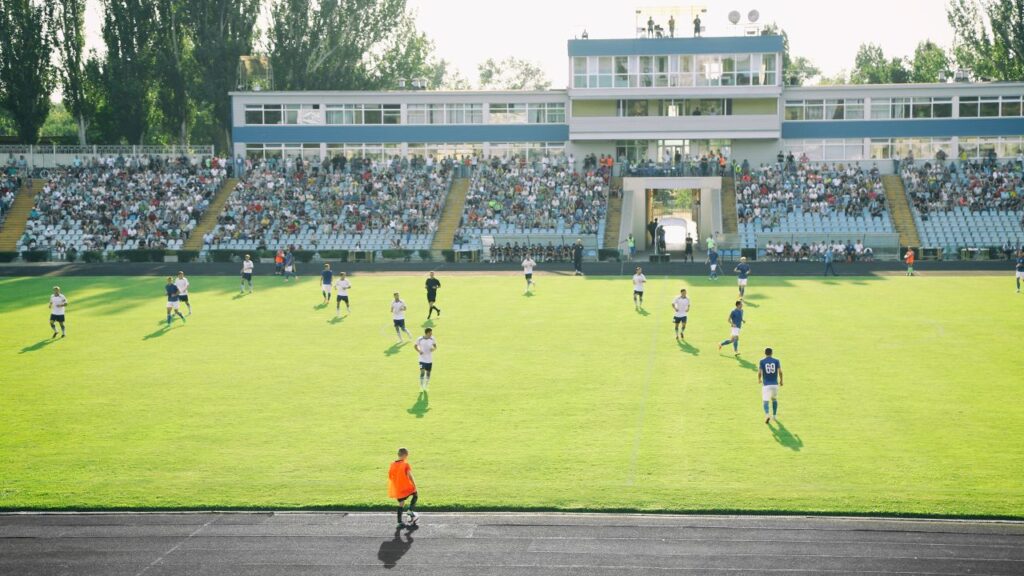Boost your betting experience and get up to $200 bonus right now!
UEFA has unveiled the host cities for its upcoming major football tournaments, signaling a thrilling new chapter in European football’s grand spectacle. With the UK and Republic of Ireland confirmed to stage Euro 2028 following an uncontested bid, excitement is already bubbling among fans and nations alike. This decision ignited a wave of anticipation, as preparations ramp up across iconic stadiums spread over five UEFA member countries. The bid’s approval came after the withdrawal of Turkey’s rival proposal, which pivoted to co-host Euro 2032 with Italy, highlighting the intricate dance of football diplomacy and big-stage hosting ambitions. From legendary Wembley to the ambitious Bramley Moore Dock Stadium under development, these venues are eager to etch new memories in football history.
The Euro 2028 tournament promises to be a cornucopia of culture, rivalry, and relentless passion, with cities like London, Manchester, and Dublin poised to welcome millions. Alongside this, a fresh inventory of stadium infrastructure, some with roots tracing back over a century, will showcase modern upgrades and historical gravitas, blending the old and new of the football cityscape. As the clock ticks down to kick-off, the engagement of brands from Nike to Heineken and Volkswagen confirms that Euro 2028 is not just a tournament but a global festival, weaving football’s magic into the fabric of communities across Europe.
Beyond the UK and Ireland, the tournament landscape is evolving with Turkey and Italy’s joint Euro 2032 hosting bid, while planning and frameworks for subsequent tournaments breathe life into the beautiful game’s future. This dynamic ecosystem reflects UEFA’s commitment to spreading the game’s impact while nurturing football identity across cities and cultures. Fans can expect stories of underdog triumphs, star-studded lineups, and the electrifying atmosphere that only such tournaments deliver. This is the stage where football’s past and future meet under the spotlight of the world’s gaze.

Sommaire
ToggleEuro 2028 Host Cities: A Vibrant Melting Pot of Football Passion
The selection of host cities for Euro 2028 marks an exhilarating milestone, merging tradition with modern football culture across the UK and Ireland. This collaborative hosting effort spans ten stadiums distributed over five UEFA members: England, Scotland, Wales, Northern Ireland, and the Republic of Ireland. The challenge to ensure each participant nation has a venue demonstrates a uniquely inclusive spirit, offering fans nationwide a taste of the continental tournament fever.
Among the critical venues, Wembley Stadium stands tall as a temple of football grandeur. Hosting a capacity crowd of 90,000, it has been the site for momentous events, including the 1966 World Cup final and Euro ’96 games. The stadium’s history will blend with the energy of modern fans as it prepares to be a centerpiece for Euro 2028 matches, underlining football’s continuity and evolution.
Across Scotland, Hampden Park carries its legacy into the future, acting as a vibrant football cathedral with a capacity of just over 51,000. Its role in Euro 2020 demonstrated Scotland’s ability to host top-tier matches with intense atmosphere. Similarly, Principality Stadium in Cardiff, largely recognized for rugby, stands ready to showcase football’s versatility and adaptability in Wales, boasting almost 74,000 seats and a roof that shields fans from the unpredictable weather.
England’s vibrant football hubs boast other landmark stadiums like the Etihad Stadium in Manchester and the Tottenham Hotspur Stadium in London. The Etihad, home to Manchester City, combines sleek modernity with fan fervor, holding 53,000 spectators, while the Tottenham Hotspur Stadium impresses with its £1 billion investment, technologic edge, and 62,850 capacity.
For the ambitious, brand-new Bramley Moore Dock Stadium in Liverpool will aspire to meet the tournament’s needs despite still being under construction. Promising a 52,888 capacity, this stadium will symbolize growth, embedding fresh football culture along the historic Liverpool docks. It’s one of the few venues generating debate and excitement due to its imminent completion and the role it will play in shaping Liverpool’s sporting landscape.
- 10 stadiums across five UEFA member countries
- All nations in the bid feature a host venue
- Mix of historical landmarks and modern arenas
- Capacity ranges from just over 31,000 to 90,000
- Combines tradition, innovation, and cultural pride
| City | Stadium | Capacity | Year Constructed |
|---|---|---|---|
| London | Wembley Stadium | 90,000 | 2007 (renovated) |
| Manchester | Etihad Stadium | 53,000 | 2003 |
| Liverpool | Bramley Moore Dock Stadium (under construction) | 52,888 | 2024 expected |
| Newcastle | St. James’ Park | 52,305 | 1892 |
| Cardiff | Principality Stadium | 73,931 | 1999 |
| Birmingham | Villa Park | 42,657 | 1897 |
| Glasgow | Hampden Park | 51,866 | 1999 upgraded |
| Dublin | Aviva Stadium | 51,711 | 2010 |
| Belfast | Casement Park (under construction) | 31,661 TBD | 2024 expected |
These stadiums don’t just host football; they carry unique identities, synonymous with the cities they reside in, echoing themes explored in football identity and city culture. The fan experience in each will be amplified by the presence of global sponsors like Nike and Adidas delivering the latest kits, and brands like Coca-Cola and Heineken energizing supporters throughout the tournament.
Building Connections Between Nations Through Stadiums
The United Kingdom and Ireland have turned the tournament into more than a football competition — it’s a celebration of shared culture and sporting passion. For fans, the prospect of navigating between iconic cities with their unique flavors mirrors the ways multi-nation tournaments inspire unity through sport. Just Eat and Booking.com play crucial roles in enhancing travel and hospitality, ensuring seamless fan journeys.

Strategic Insights: UEFA’s Approach to Hosting and Tournament Planning
Behind the scenes, UEFA’s tournament host selection goes beyond mere venue availability. It’s a strategic move that balances political complexities, infrastructure readiness, and fan accessibility. The UK/Ireland bid’s success reflects detailed planning, boasting a robust portfolio of stadiums with international pedigree and fan-friendly environments.
UEFA’s meticulous evaluation ensures that each tournament not only thrills on the pitch but also benefits host cities economically and socially. The influx of fans pumps vitality into local economies, from Volkswagen-fueled transport logistics to hospitality sectors benefitting from the boom in bookings, thanks to platforms like Booking.com. Exposure for local communities is enhanced by FedEx logistics ensuring merchandise flows smoothly, and Qatar Airways facilitating international fan travels.
Additionally, UEFA places emphasis on sustainability and legacy. Stadiums such as Tottenham Hotspur and Etihad offer eco-friendly design features, aligning with modern demands for green sports infrastructure. UEFA’s insistence on legacy planning means these venues will be hubs of community engagement, youth football programs, and cultural events long after the final whistle.
- Bid evaluation includes infrastructure, accessibility, and legacy
- Economic boost for host cities via tourism and branding partnerships
- Brands like Puma and Heineken play integral roles in event promotion
- Sustainability increasingly underpinning stadium development
- Collaborations across UEFA members for logistical efficiency
| Factor | Details |
|---|---|
| Infrastructure | Modern stadiums complemented by historic venues ensuring robust facilities |
| Economic Impact | Local businesses experience surge in tourism and global attention |
| Transport | Supported by Volkswagen, FedEx, and Qatar Airways for seamless connectivity |
| Fan Experience | Enhanced by Just Eat food delivery services and Booking.com accommodations |
| Legacy | Commitment to community engagement and sustainable sports developments |
The success of the UK/Ireland bid illustrates how football intertwines with societal growth and cultural exchanges. This approach supports UEFA’s broader objectives of football as a global unifier, a theme closely linked to the global impact of football in bridging communities.
Contest and Cooperation: Turkey and Italy’s Joint Euro 2032 Bid
The story of UEFA tournament hosts extends beyond 2028. With Turkey stepping down from the Euro 2028 race, the nation is collaborating with Italy to stage Euro 2032. This joint bid balances Turkey’s burgeoning football infrastructure ambitions with Italy’s rich tournament hosting legacy. UEFA’s final decision on October 10 is highly anticipated, promising a tournament that will merge different cultures and footballing philosophies on a continental scale.
This partnership illustrates how UEFA fosters cooperative ventures to optimize resources and stage the best possible events. Italy’s stadium portfolio is extensive, featuring iconic sites like the San Siro and Stadio Olimpico, while Turkey presents a mix of modern arenas such as the Atatürk Olympic Stadium. The diverse geographic and cultural experience promises a compelling narrative for fans and players alike, echoing themes found in football’s societal role in cooperation.
- Joint bid to leverage complementary strengths
- Turkey brings new, state-of-the-art stadiums
- Italy contributes historical venues and football heritage
- Expected to boost football development across both countries
- Potential to create a tournament uniting East and West Europe
This joint hosting effort, much like the UK/Ireland collaboration, strengthens UEFA’s model of expanding football’s reach and diversity. The bid’s approval will kick-start preparations that incorporate advanced logistics and fan experiences driven by partners like Nike and Adidas, coalescing sporting performance with global marketing powerhouses.
Football’s Future Footprint: Stadium Innovations and Cultural Impact Across Europe
Stadiums are more than just venues; they are cultural landmarks, economic engines, and symbols of a city’s identity. The evolving football landscape of Europe injects fresh life into these stadiums with technological upgrades, comfort enhancements, and sustainable construction methods. Bringing the tournament to cities like Belfast with Casement Park’s redevelopment introduces Northern Ireland prominently to football’s grand theater.
Future-planning also includes improved digital fan engagement, leveraging apps and augmented reality, enhancing matchday atmosphere and accessibility. UEFA’s commitment to gender-neutral facilities at all venues sets a progressive tone, ensuring inclusivity for all fans. Brands like Puma, Coca-Cola, and Heineken sponsor these innovations, amplifying the fan experience through savvy marketing and fan interaction.
These developments are part of a wider narrative about football’s enduring capacity to inspire – as explored in stories of legendary stadiums’ history and memory, and how these arenas shape sporting cultures and community identities. This commitment to heritage complements the modern fan’s expectations, combining spectacle with warmth and belonging.
- Incorporation of smart stadium technologies
- Focus on inclusive, accessible fan environments
- Commitment to sustainability and community use
- Partnerships with global sponsors for enhanced experiences
- Northern Ireland’s rising profile with Casement Park’s addition
| Feature | Example |
|---|---|
| Technology | Augmented Reality apps, high-speed connectivity |
| Inclusivity | Gender-neutral toilets available at all venues |
| Sustainability | Renewable energy-powered stadium systems |
| Community Engagement | Youth programs and multi-use facilities |
| Brand Activation | Engagement campaigns by Nike, Adidas, Coca-Cola |
Football matches become more than games — they transform into shared experiences weaving a web of identity between fans and cities. For deeper reflections on football’s social resonance, readers can explore narratives on urban football and future stars.
Join today and grab up to $200 bonus for your next bets!
Content assisted by AI. This article was created in whole or in part with the help of artificial intelligence.


